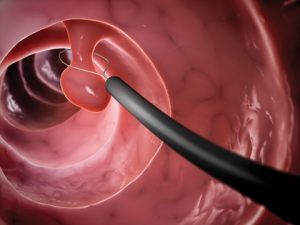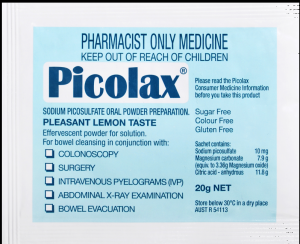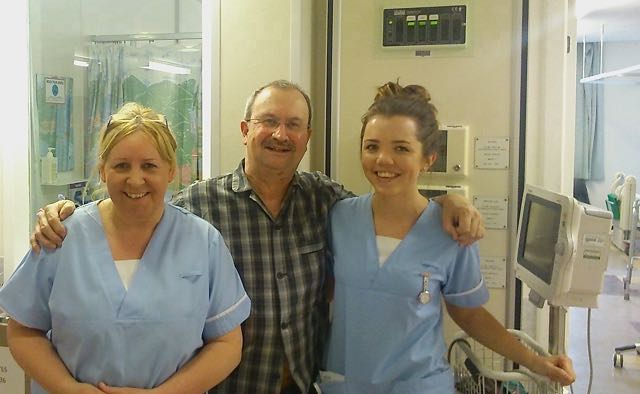If you’ve managed to survive all the radiotherapy, chemo, surgery and the CT or MRI scanning that goes with treating bowel cancer, well done! But don’t think you are completely out of the woods…
I called this the “dreaded camera” in earlier blogs – but actually it is not half as bad as it sounds.
So what’s involved?
Well, a colonoscopy is a test that allows the doctor to look at the lining of your colon, or large bowel.
It does this by passing a long flexible tube, about the thickness of your index finger, through the anus and into the bowel.
 At the front is a camera and tiny forceps, which can remove polyps from the lining of the colon. These samples are sent to a lab to test for any sign of the cancer returning.
At the front is a camera and tiny forceps, which can remove polyps from the lining of the colon. These samples are sent to a lab to test for any sign of the cancer returning.
Worst bit is the prep
The worst bit is actually the preparation in the days leading up the procedure.
Four days before you must stop taking any medication that might make you constipated and that includes Loperamide and Imodium. In cases like mine, where part of the bowel has been removed, these drugs are the essential props that allow bowel cancer survivors to lead as normal a life as possible. Along with codeine, they slow down the ‘poo’ process and allow you to go out and about by reducing fear of mishaps.
Strict diet
Things get even tougher two days before when a strict diet must be followed.
 First cut out any fibre supplements, such as Fybogel – another staple for bowel cancer survivors – which helps make you go if you are suffering from constipation.
First cut out any fibre supplements, such as Fybogel – another staple for bowel cancer survivors – which helps make you go if you are suffering from constipation.
It is a pretty boring diet and seems designed to put you off food altogether.
There are slight variations in the advice from one hospital and country to another. But basically you are only allowed to eat lean white mean and white fish (nothing fried), eggs and boiled or mashed potatoes. No milk is allowed and hardly any butter and you can’t drink alcohol. Oh, you are allowed white bread, white rice and white pasta. Nothing wholemeal and no fruit or veg apart from boiled or mashed potatoes.
You also have to drink as much liquid as possible. Black tea or coffee are allowed along with clear fruit squash, Lucozade and things like Oxo and Bovril as well as water. You can also have plain jelly, rich tea biscuits and honey.
Starvation for a day or so
You take four Senna laxative tablets at 10pm two days before the colonoscopy, which makes you head for the loo about four hours later,
Then the day before the colonoscopy, you must stop eating completely – around 1pm – until after the camera test. For me this was scheduled for 4pm the next day.
 If your hospital follows the routine at Middlesbrough’s James Cook University Hospital, you take the first of two doses of another powerful laxative called Picolax with loads of water at 6pm the day before your appointment. This is designed to clear the system by the time of your camera test.
If your hospital follows the routine at Middlesbrough’s James Cook University Hospital, you take the first of two doses of another powerful laxative called Picolax with loads of water at 6pm the day before your appointment. This is designed to clear the system by the time of your camera test.
You need your bowel to be clear as possible so the camera can see any polyps attached to the bowel lining and the second dose of Picolax is taken about four hours before the test.
Things not going quite to plan
Now, things didn’t go exactly as planned in my last colonoscopy at the beginning of September 2019.
The Senna tablets did their job and kept me awake and on the loo from 2am for an hour or more. But the Picolax was slow to get the desired reaction and only really stated working when I was in the Endoscopy Unit waiting for my turn to get “filmed”.
Luckily they were running late and I didn’t embarrass myself during the colonoscopy. But the next day (after the treatment) all hell let loose and I only managed to bring things under control by taking three does of Loperamide.
Tips for having a colonoscopy
So, what tips have I have learnt to pass on to any readers who may be having a colonoscopy in the future.
Well, I took up the offer of sedation this time and was glad I did. It made the actual colonoscopy as painless as possible and I actually watched the whole process on the TV screen used by the doctor to spot the two polyps in my case. These have been sent off for analysis.
Last time I just had gas and the whole thing was rather unsettling. You are awake while under sedation and it does make you a queasy afterwards, but I think it is worth it.
Secondly, don’t believe everything the Picolax instructions say. I think I should have taken the second dose about six hours before my colonoscopy as it took about five hours to have any effect.
And thirdly, don’t be put off having a colonoscopy as it is only takes about half-an-hour and despite sounding awful it remains the best way to check if the cancer has returned.
I won’t have another one for five years now unless I report any symptoms such as blood in my poo.
So, readers I hope that has been helpful.
- If you want to see my earlier blogs, see here.





